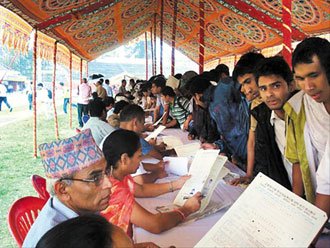A record 42,050 Nepalese have applied to take S. Korea’s EPS-KLT exam for a chance to work there, reports Chosun Ilbo, citing Nepal’s Labor Ministry. Those with the top 4,000 test scores will be able to work in Korea.
The KLT-EPS tests have been administered in 15 countries by Korea’s Human Resources Development Service since it was introduced in 2004. The previous record high was 41,756 applicants in Indonesia last May. The number of Nepalese applying this year is tops that record, a remarkable development given that Nepal’s population of 28.9 million is far smaller than Indonesia’s 240 million.
“South Korea is a lucrative destination for Nepali migrant workers where a worker can earn up to US$1,000 monthly,” reported the Himalayan Times in June. Most of the 3 million Nepalese working overseas earn far less than the $1,000 per month they can earn in S. Korea by working 10 hours a day, 25 days a month at even the minimum wage of about $3.80 per hour plus overtime. In India, Malaysia, Saudi Arabia and Qatar they earn around only about $200 per month. In Hong Kong they average $350. The average salary in Nepal is only about $40-$83 per month.
“To Nepalese people passing the EPS-KLT is like winning a lottery,” said a 45-year-old man who runs a travel agency. A Negaplese worker accepted to Korea and works three to five years can return home to a comfortable life.
The high demand to participate in the EPS-KLT has swamped the Nepalese Labor Ministry and Korean diplomats in Nepal. The test will be administered over two days in two groups of around 20,000 people at 28 schools. The tests will be supervised by 2,098 proctors and 630 Nepalese police officers.
The demand for Korean work permits has allowed about 100 Korean language schools to to thrive in Nepal. Students pay 50,000-100,000 Nepalese rupees ($700 – $1,300) a month for classes that are often of inferior quality. Those who pass the exam are sent in groups over two and a half years, opening applicants to unscrupulous brokers who make false promises of priority job postings.
Nepal’s Ministry of Labor and Transport Management has asked the Korean government to administer the test more often and ultimately to admit more Nepalese workers to Korea.


